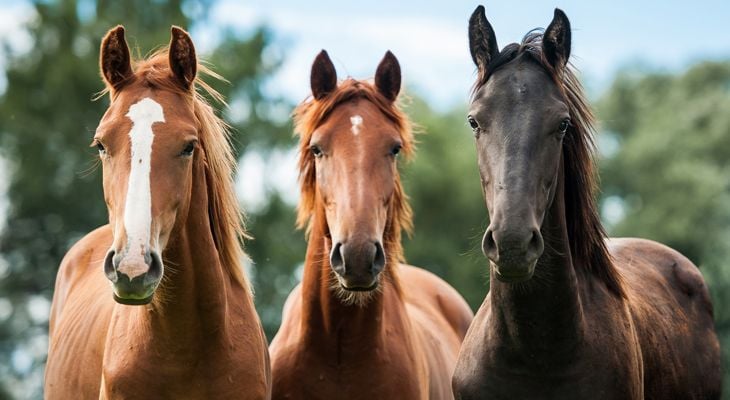Breeding horses is a complicated topic, but this quick overview will provide you with enough information to talk with a breeder or your veterinarian about breeding your horse. Role of the Stallion A stallion is a male horse that has not been castrated. The stallion’s role in breeding is to provide
Read more

Owning a horse is a big responsibility. It requires a commitment of both time and money. The new owner should be prepared to spend time grooming, exercising, and caring for the animal, or assume the responsibility to see that the basic care will be performed daily. Unless the horse is kept on the owner's property, travel time to and from the stable must be considered. The costs of owning a horse can add up quickly as you provide shelter, feed, medical care, shoeing, and riding equipment.
If You Choose A Pet Horse
Before buying a horse for their children, parents would be wise to reinforce the child's commitment. Arrange with a local stable for lessons for your youngster. Give your child the opportunity to participate in supervised care of a horse for a month or two. If the youngster "sticks" with the chores of horse ownership, he or she is probably responsible enough to own one. Before you purchase a horse, decide where you will keep the animal and how much it will cost. In many instances the purchase price is not as much as the annual boarding fee. If you live on property that can support a horse - legally and physically - be sure that you have adequate stabling. If you live in a cold climate, you might want to consider boarding the animal, at least during the winter months, at a stable with an indoor arena. Riding in freezing weather is unpleasant and can even be dangerous for both horse and rider.
What Kind of Horse Should You Get?
Because riding is a team sport - of the horse and rider - it is important that you buy a horse that suits the temperament and style of the rider. A nervous, fearful rider should have a calm horse that will not react in kind. A child should not have a horse or pony that will bolt. An experienced rider will want a sensitive horse that responds to the slightest commands.Before you decide to buy a horse of your own, you should already have some riding experience or have taken riding lessons. Once you understand your riding abilities and limitations, you will be in a better position to choose a horse with a temperament that will suit you.You should also consider the type of riding you intend to do. "English" riders may want a purely pleasure horse for riding "on the flat." Other "English" riders may want a horse that will jump, or even one that can be taken on the hunt field. "Western" riders may want a horse to use for trail riding, working cattle, or other "Western" show events.Whichever style of riding you prefer, it is best if the first horse you buy is already "schooled." First-time horse owners should avoid younger animals that require a lot of training. An older horse that already has the skills you need is usually a better buy for the first-time owner and younger rider.
Please continue reading the below articles for more useful information on owning a horse.
-
Breeding
-
Where Do You Look For a Horse?
A good place to buy a horse is the stable where you ride or plan to keep the horse. The stable owner has an interest in keeping you satisfied, and knowing your abilities and temperament he or she can suggest a suitable animal. Riding instructors are also good agents for locating a suitable horse since
Read more -
Examining Your Horse
Even if you fall in love with the horse, do not buy it before the animal has been thoroughly examined by a veterinarian with experience in performing purchase examinations. Long-time horse owners almost always have a veterinarian examine any animal before purchase and first-time owners should certainly
Read more

